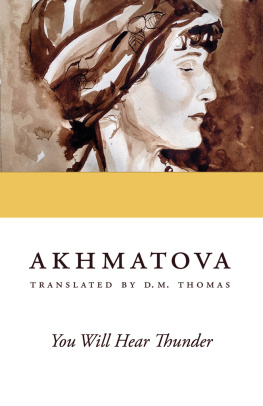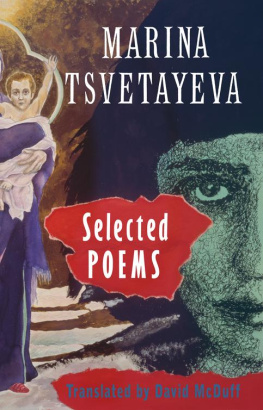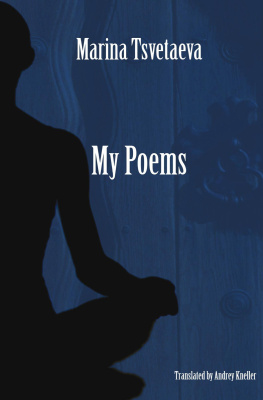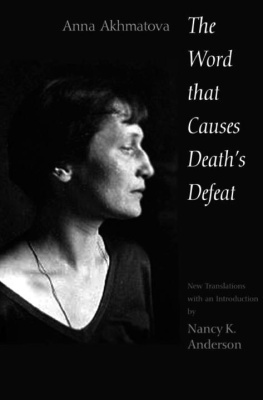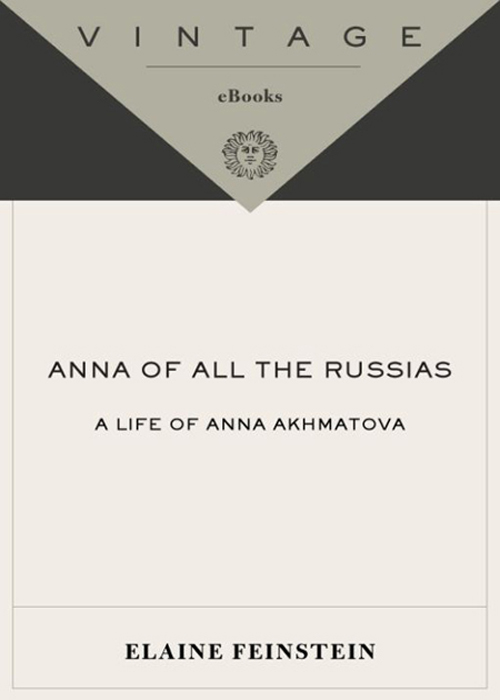
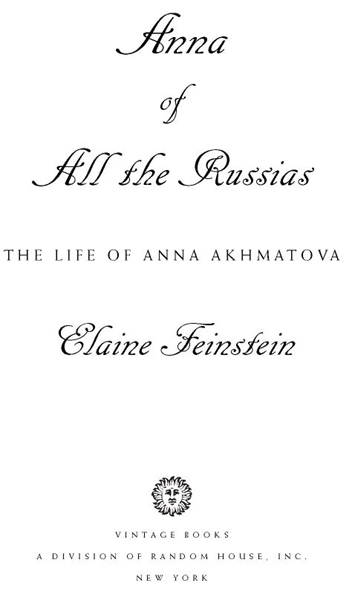
Table of Contents
In memory of my husband,
Arnold Feinstein
ACCLAIM FOR ELAINE FEINSTEINS
Anna of All the Russias
Thorough and captivating.... A particularly impressive job.
San Francisco Chronicle
Feinstein deserves credit for refusing to idealize a woman whose words were powerful enough to potentially get her killed.
Vogue
Rich, affectionate, unsparing.
Harpers Magazine
Brilliant.... Compulsively readable.... As a poet herself, Feinstein is adept at showing just why and how Akhmatovas unique voice has intoxicated readers.
The Independent (London)
Feinsteins achievement is to show us the life of an extraordinary woman in gleaming fragments, and to demonstrate, through so many witnesses, how she was worshipped.
The Observer (London)
Eminently readable.... Feinstein has done English-speaking readers a great favour by making Akhmatovas life story, and therefore her poetry, more accessible to us than ever before.
The Spectator (London)
In the first biography in decades, Feinstein skillfully chronicles Akhmatovas shockingly destitute life and untangles her snarled and painful relationships.... What distinguishes this judicious and riveting biography most are Feinsteins translations of Akhmatovas incandescent poems of steely defiance.
Booklist
ACKNOWLEDGMENTS
All the translations of Akhmatovas poems in this book are my own. For many of the prose passages translated in this volume I worked from literal versions. For these, I am indebted to Alla Gallich, Emily Finer, Irina Kostyrina, Daisy Cockburn and Nigar Hasan Zade. Prose from published books is acknowledged in the Notes.
I am aware that Russians find the use of first names without patronymics discourteous. However, an English readership is uncomfortable with patronymics. Hence, after the childhood of the people in this story, I have generally used surnames aloneAkhmatova, Gumilyov, Puninwhich seems acceptable to both groups.
I should like to thank Yevgeny Rein, Mikhail Ardov and Anatoly Nayman, who knew Akhmatova well and were kind enough to speak to me at length in 2003; also Nadya Rein, who answered questions by email, and Anna Kaminskaya, granddaughter of Nikolay Punin, who spoke to me at some length in St. Petersburg in 2003. I am grateful to Dmitry Bobyshev, who responded to my emails, and to Mikhail Meylach, who spoke to me in St. Petersburg.
I am grateful to Richard McKane, who generously shared his wide knowledge of Akhmatova on many occasions, and also helped me trace source notes; to Jana Howlett for useful conversations and her network of Russian friends; and to Elena Riumina and Valerie Paikova, whose help in Russia went far beyond the duties of an interpreter in 2003.
I gratefully acknowledge the following sources from which I have drawn and quoted: FTM Agency Ltd. for 684 lines of Anna Akhmatovas poetry; Anna Akhmatova, My Half Century: Selected Prose, trans. Ronald Meyer (Ann Arbor, 1992); V. I. Chernykh, Letopis, zhizni, i tvorchestva Anny Akhmatovoi (Moscow, 2003); Sergey Lavrov, Sudba i idei (Moscow, 2003); Orlando Figes, A PeoplesTragedy (London, 1996); Konstantin Polivanov, Anna Akhmatova and Her Circle (Fayetteville, 1994); Frances Laird, Swansongs (First Books Library, 2002); J. Marin King, A Captive Spirit (Ann Arbor, 1980); Amanda Haight, Anna Akhmatova, A Poetic Pilgrimage (New York and London, 1976); Solomon Volkov, Conversations with Joseph Brodsky (New York and London, 1998); Solomon Volkov, St. Petersburg (London, 1996); Lydia Chukovskaya, Entretiens avec Anna Akhmatova (Paris, 1980); Nadezhda Mandelstam, Hope Against Hope and Hope Abandoned (London, 1975, 1989); Emma Gerstein, Moscow Memoirs (London, 2004); Irma Kudrova, The Death of a Poet, trans. Mary Ann Szpozrluk (London, 2004); Simon Sebag Montefiore, Stalin (London, 2003); Lydia Chukovskaya, The AkhmatovaJournals (London, 1994); Maria Enzensberger, Listen! (London, 1991); SelectedPoems of Alexander Blok, trans. Jon Stallworthy and Peter France (Oxford, 1970); Lois Oliver, Boris Anrep: The National Gallery Mosaics (London, 2004); S. Monas and J. Green Krupala, Diaries of Nikolay Punin (Harry Ransom Humanities Research Center, University of Texas Press, 1999); Vera Inber, A LeningradDiary (London, 1971); Georgy Dalos, The Guest from the Future (London, 2000); Sophie Ostrovskaya, Memoirs of Anna Akhmatovas Years, 194450 (Liverpool, 1988); Anatoly Nayman, Remembering Anna Akhmatova (London, 1991); Faina Ranevskaya, Dnevnik na klochkakh, ed. Dmitry Sheglov (St. Petersburg, 2002); F. Ranevskaya Monolog (Smolensk, 1998); and Faina Ranevskaya, Sudba shlokha (Moscow, 2003).
I should particularly like to thank Veronique Lossky, who thought through some of the problems with me; Professor Valentina Polukhina, who gave me advice and introductions to people who could help me; and Pamela Davidson. I am grateful to Lady Berlin, who spoke to me in Oxford in 2004. Particular thanks are also due to Nina Popova and her assistants at the Akhmatova Museum in St. Petersburg. I should like to thank Simon Sebag Montefiore, who introduced me to several notable archivists, and Jennifer Anderson and Anne Wollheim for help in relation to Boris Anrep. I am indebted to Roberta Reeder, not only for her scrupulous scholarship in Anna Akhmatova: Poet &Prophet (1994), but also for her help and personal friendliness when she visited me in London in 2004 and for giving me a list of publications which have appeared since her book came out. There has indeed been much important new material in recent years which throws fresh light on Akhmatovas life, for instance the work of Vadim Chernykh, Letopis, zhizni i tvorchestva, Vol. I (1996) to Vol. 4 (2003); S. Monas and J. Green Krupala, and Leonid Zykovs editions of the journals of Nikolay Punin (2000);1 the work of Sergey Lavrov, Sudba i idei (2003), which includes Lev Gumilyovs autobiography; and Emma Gersteins Moscow Memoirs, first published in 1998 in Moscow and now available in John Crowfoots English translation from Harvill Press (2004), along with other publications listed in the Select Bibliography.
I should like to thank my editor, Ion Trewin, and his assistant editor, Anna Herv, for all their help, and Linden Lawson, Margaret Body and Ilsa Yardley for their meticulous attention to detail. I am very grateful for a grant from the Society of Authors, made in 1998, which helped to launch me on this project; and for a Wingate Scholarship, which enabled me to return to Russia, travel to Germany and spend the necessary time on this book. As always, I am deeply grateful to my patient secretary, Jane Wynborne.
While every effort has been made to trace copyright holders, if any have inadvertently been overlooked, the publishers will be pleased to acknowledge them in any future editions of this work.
ILLUSTRATIONS
First insert:
Anna Andreevna Akhmatova, 1922
Andrey Antonovich Gorenko, Akhmatovas father, St. Petersburg, 1882
Inna Erazmova Stogova, Akhmatovas mother, circa 1870
Anna with her brother, circa 1905
Akhmatova as a young girl, Sebastopol, Ukraine, 1899
Next page

